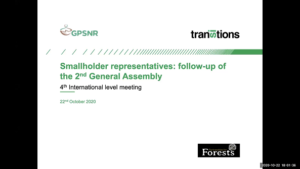The Member Consultation period for the proposed GPSNR Policy Components and Baseline Reporting Requirements closed on 3 July 2020. All comments received as part of the consultation exercise were discussed by the Policy Toolbox Working Group over several rounds of calls. There has also been healthy dialogue between various membership categories and the Working Group on the alignment of the Policy Components.
Meanwhile, pilot testing for the Baseline Reporting Requirements is in progress, with 10 GPSNR member volunteers participating in the exercise. The Secretariat will be interviewing each of the volunteers in the coming weeks to gather feedback on their experience in submitting the Baseline Reporting Requirements data. More updates will be shared in due course.
At this stage, finalized versions of the Policy Components and related documents have been submitted by the Policy Toolbox Working Group to the Executive Committee for review and further discussion at the Executive Committee level. The Policy Components will then be brought to the GPSNR General Assembly for voting.
The formulation of Policy Components is a critical piece in fulfilling GPSNR’s vision of a fair, equitable and environmentally sound natural rubber value chain.
All GPSNR members, at the time of joining the Platform, committed to this very vision, as well as 12 principles of sustainable natural rubber as defined by GPSNR. The Policy Components were developed to provide more specificity to the 12 Sustainable Natural Rubber Principles. Within the proposed Policy Components are key commitment details to no deforestation/ conversion/ degradation, upholding human rights, supply chain transparency and monitoring and reporting.
If approved, the Policy Components will act as a clear and guiding framework for GPSNR company members to establish or update supply chain commitments through their natural rubber purchasing policies.
Adopting a policy allows a company to signal that the issues covered by the policy are important to the company, and that resources and capacities will be dedicated to addressing the issues in order to comply with the policy. Policies, while illuminating the goals that a company is working towards, also enables these commitments to be channelled upstream to suppliers and downstream to buyers, with the potential to transform the entire supply chain.
Following the Policy Toolbox Working Group’s observation that common questions and concerns were raised by GPSNR members during the Members Consultation period, the Working Group has developed a supplementary FAQ document to provide detailed responses to address these concerns, in a bid to provide greater clarity on the Policy Components. These will be circulated to the GPSNR membership in August, along with all other proposed resolutions.





